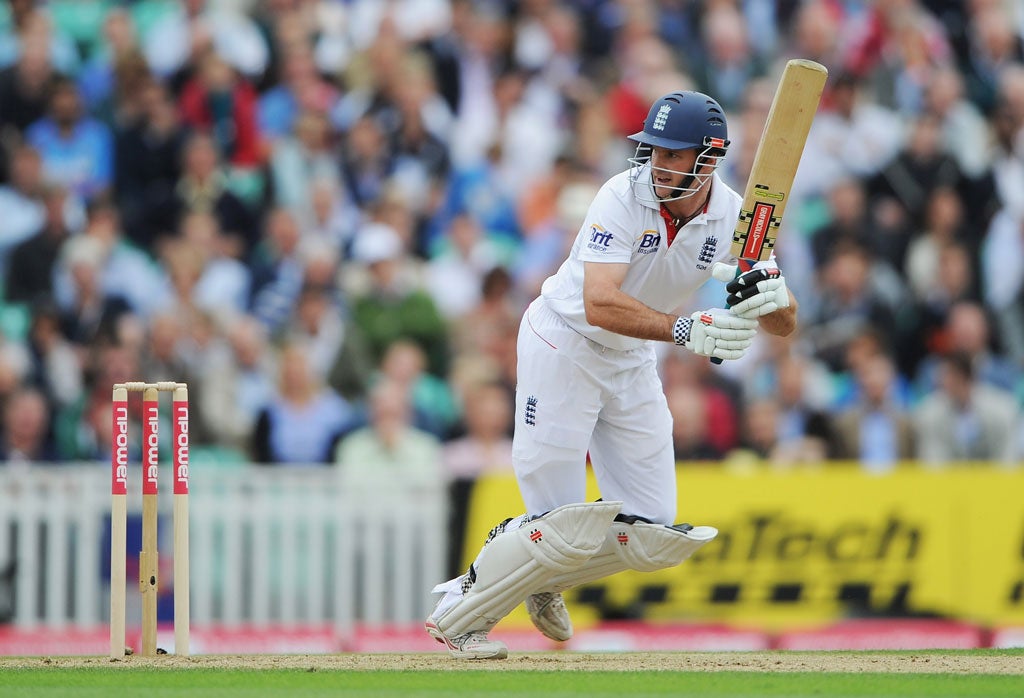Ten people who changed the world: Andrew Strauss, cricketer who set new standards for English sport
Whether in the cut-throat field of politics or the fashion industry's corridors of power, this year they left our planet a better place. Celebrate 10 of the best, nominated by Independent writers

Quite a lot of high-profile sportsmen appear to have a better chance of reflecting the world, and some of its basic frailties, than making it a better place. However, if this is true, and a rash of super-injunctions and adolescent anarchy this year suggested that it might well be, the achievement of England's cricket captain is made especially creditable.
Andrew Strauss not only helped complete a remarkable transformation of the national team by winning back and then retaining the Ashes in Australia at the turn of last year.
In the high and tumultuous summer, when the rioting threatened to engulf the third Test match in Birmingham, the 34-year-old Strauss led England to a crushing 4-0 series win over India and number-one ranking in the world. As impressive as the winning play, though, was the competitive character and commitment on which it was built.
This was the triumph of a three-year effort that had transformed a team which, when handed over to Strauss and Zimbabwean coach Andy Flower for a tour of the West Indies, had resembled just another failing branch of the celebrity sports culture.
Kevin Pietersen, a magnificently talented batsman but someone not famous for self-imposed discipline, had resigned as captain amid much controversy. The overwhelming sense was that England's cricket team, like the one of football which had just been ejected humiliatingly from the European Championship qualifying series and the rugby team that, as it turned out, were already on the road to the disaster of the recent World Cup tournament in New Zealand, had lost both the will and the means to compete at the highest level.
The Strauss-Flower partnership systematically dismantled this dispiriting idea. Strauss was born in South Africa and spent some of his youth in Australia. These may well have been formative influences because if Strauss's style is unshakeably laid-back and English, there is also a competitive, hard-nosed drive to win that has blended perfectly with the imperatives of a coach who not only represented Zimbabwe with brilliant accomplishment in Test cricket but also displayed a nerve and a conscience that flew beyond the boundaries of a cricket field.
In the 2003 World Cup, Flower and his black team-mate, Henry Olonga, walked to the wicket wearing black armbands. They explained they were mourning the death of democracy in their beloved Zimbabwe. After defying the regime of Robert Mugabe, Flower plainly believed that re-animating England cricket was at the very least a manageable test of nerve.
The project was launched after England batted abysmally at the start of that West Indian tour. The team were shot out for an embarrassing 51 and Strauss and Flower announced they would demand entirely new levels of application – and self-examination. It has been a relentlessly prosecuted campaign and it has produced the standards that another England captain, Michael Vaughan, called for in the wake of a brilliant winning Ashes campaign in 2005.
That was crowned by victory at the Oval and long days of celebration, notably a bus-stop tour of the West End of London and a Downing Street reception from which the star of the series, Andrew Flintoff, emerged tired and emotional and glassy-eyed. Vaughan said that he hoped his team would stay honest – and remember the foundation of their achievement, a summer-long refusal to give an inch to an ageing but still gifted Australian team.
It was a cry that went unanswered. Flintoff was appointed captain when Vaughan was injured and proved quite out of his depth when the Australians claimed a 5-0 series revenge back on home soil. When that ground was re-claimed by Flower and Strauss, it was only after they had imposed a new and infinitely tougher regime.
Pietersen, particularly, railed against the order that wives and girlfriends would not be allowed to join the tour until the third Test in Perth, by which time the coach and the captain believed that the team would have found the required levels of single-mindedness.
When the England rugby team imploded so miserably at the World Cup, when senior player and vice-captain Mike Tindall survived a drunken spree in the first days of the tournament, despite undermining the manager Martin Johnson's declaration that he would put his trust in his 'adult' charges, it was impossible not to regret the disregarded example of the cricket team that had made itself the best in the world.
Commitment has to be re-doubled if England are to maintain their momentum in the coming Test series against Pakistan, Sri Lanka and a formidable South African team. "We now face our biggest test," says Strauss. "It's a different mindset being the hunted rather than the hunters. It means if we want to stay on top we have to retain a desperate desire to improve."
Strauss was speaking for English cricket, but in an Olympic year, he might have been rallying the entire sports nation. Hopefully, he was – and with the most impeccable credentials.
Join our commenting forum
Join thought-provoking conversations, follow other Independent readers and see their replies
Comments
Bookmark popover
Removed from bookmarks